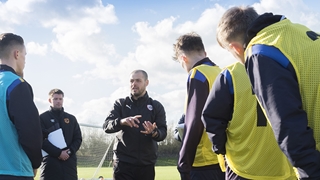
Coping Through Football is an inclusion project that uses football as a tool for engagement and therapy. The outcomes are not football related but are about helping people with mental health issues to get their lives back on track.
At London Playing Fields Foundation we’ve always been aware that the benefits of football extend well beyond the pitch, it can be much more than just learning new skills and tactics and have a major impact on wider health and social aspects.
The origins of our project date back to 2005 when we were really concerned about the number of young men who were taking their own lives. The biggest killer of men between the ages of 20 and 49 is suicide. From our research we also found out there was a disproportionate number of black men who’d been hospitalised due to poor mental health. Not only that, they had the poorest outcomes, and were the least likely to engage with services. We wanted to come up with something new that would bring them into more contact with health professionals and thereby transform community mental health services.
However, we could only achieve this via a collaborative approach with the NHS, so on 14th December 2005 I left our Groundsman’s Christmas lunch at The Eagle pub in Snaresbrook and made the short journey to the Primary Care Trust in Leytonstone to sell the benefits of Coping Through Football. We recognised that if the project was to be sustainable and more than a sticking plaster intervention, it had to be underpinned by clinical protocols including accepted contact and referral and assessment and review systems. To complete the partnership, we enlisted Leyton Orient Trust to deliver the coaching sessions.
Realising that the project had to be evidence led if it was to have a long term future, I asked the Institute of Psychiatry to point us in the right direction. They introduced me to Dr Oliver Mason Head of Research at NELFT (North East London Foundation Trust) who designed a six point evaluation methodology. So what we were able to do, right from the beginning, was to have a project that had clinical credibility, coaching credibility and a clear way of measuring what success looked like.
From the outset we focused on people at the more serious end of the continuum with more severe mental health conditions. 39% of our current service users have schizophrenia. Initially we undertook a six week pilot but as the service users loved it so much we knew we couldn’t stop and continued for 12 months without funding. Then, thanks to the Football Foundation, Capital Volunteering, City Bridge Trust and the Henry Smith Charity, we managed to get funding in place and launched the scheme in December 2007 at the Emirates Stadium. And we’ve been going ever since.
Over the years we've learned that football doesn’t always lead to happy endings, so what we did was to extract all the good bits of the football experience to provide the following benefits for our participants:
Physical activity. People with long-term mental health conditions, are usually heavily medicated which means they’re lethargic and prone to piling on weight. Secondly they sleep a lot so all our sessions start at 2pm because if we delivered the sessions in the morning they’d still be in bed. The physical activity, as well as making them fitter and thinner, also releases endorphins which helps to raise their mood.
Self-esteem and confidence. As soon as they arrive, they're met by someone who’s smiling, happy to see them. This helps to create a warm, inclusive and non-judgmental atmosphere.
Getting out of the house. There are lots of people suffering from mental health conditions who struggle to get out of the house and so become very reclusive. The project creates the opportunity for interaction and this helps to move them along the continuum towards independent living.
Mental health expertise. The Project Coordinator is an Occupational Therapist. When service users come to the session, something magical happens. They become physically active, receive a boost to their self-esteem and confidence, start being interactive and it’s at this point that we can begin working on their aspirations and getting their lives back on track. For some it’s doing a computer course, for others it’s volunteering, part-time work, or perhaps taking an FA course. The aim is to help them to live more independently so the football is like a magic portal that helps take them from the darkness into the light.
We assess them on a regular basis to monitor improvements in physical, mental and social health. When you’re ill, the thing that you want more than anything is to be normal again. So the exit route for service users who wish to play competitive football is to get them into a mainstream club. It’s not about creating a separate mental health league because as well as reinforcing the stigma, the minute you agree to play a game against another team, only 11 can play, so straight away you’re excluding some. When you sub someone off, the players will think ‘why have I been subbed off?’ We want to create stress free islands at our sessions where anxiety levels are reduced so playing competitive 11v11 football matches is not our goal. After all this is not a football project, it’s a mental health project that uses football as a therapy.
For our participants, success is about keeping them out of the in-patient wards and A&E and reducing the burden on acute care. Nearly all of them have had a spell in hospital where the cost of a bed is very expensive. From our research we know that treating someone with schizophrenia costs the NHS £72k per person per year so Coping Through Football is a significantly cost effective intervention.
Having gained their trust, it’s about considering about doing other things in their lives. Every fortnight we give them tickets to a Leyton Orient match so that they go to the football and do something ordinary. The experience gives them increased confidence and before you know it they’re going shopping with their mates to Westfield to buy a new pair of jeans. This might not seem a lot but it represents huge progress.
Sonia (the Project Coordinator) and Michael (the Peer Support Worker) will also work with them and persuade them to do some volunteering work or attend a course. Over the last year 54% went on to employment, volunteering or education or training. There isn’t a defined period where people are prescribed say for six weeks of Coping Through Football as this is an inclusion project, where participants can dip in and out depending on how they are feeling. No-one’s checking the register saying: “You didn’t turn up last week, what were you doing?”
Last year The FA very kindly hosted our 10th Anniversary Event at Wembley Stadium and later in 2018 we launched a two year piece of research undertaken by UCL which makes Coping Through Football the most evaluated football mental health project anywhere.
In providing a service with a difference over four north-east London boroughs, Coping Through Football has demonstrated three things, firstly the power of football to transform lives, secondly the importance of being evidence led and thirdly the value of working in partnerships where people don’t mind who takes the credit.









